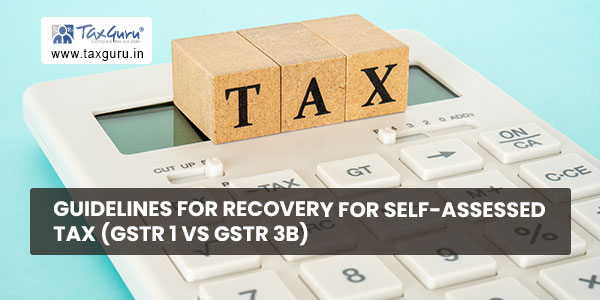Procedure for recovery for Mismatch in GSTR 3B and GSTR-1 Returns:
Central Government introduced amendment to Section 75 (12) of the CGST Rules, 2017 by inserting an explanation thereby paving way for recovery of self-assessed tax without having to resort to proceedings u/s 73 or Sec 74 of the CGST Act, 2017.
The explanation defines “self-assessed tax” to include the tax payable in respect of details of outward supplies in Form GSTR 1, but not included in GSTR 3B.
There was apprehensions that recovery proceedings, in respect of ‘self-assessed tax’ on outward supplies which have been declared in Form GSTR-1 but not included in Form GSTR-3B, can be initiated straightaway under Section 79 (i.e. through various modes like detaining/selling goods belonging to defaulter which are under control of the department, garnishee proceedings, distaining and selling of movable or immovable property belonging to the defaulting person, etc.) without even resorting to proceedings under Section 73 or Section 74 of the CGST Act.

Trade and the field formations raised doubts regarding modalities for initiation of the recovery proceedings under section 79 of the Act. CBIC has issued guidelines on 7th January, 2022 for recovery proceedings.
In view of the above, the following guidelines are hereby issued with respect to the recovery proceedings under section 79 of the Act in such cases.
1. Cases where recovery proceedings may be initiated –
a. where the tax payable as per GSTR-1 has not been paid through GSTR-3B return – wholly or partly
b. Any unpaid interest thereon
2. Genuine Cases of differences in Returns filed –
In certain genuine reason for difference between the details of outward supplies declared in GSTR-1 and those declared in GSTR-3B –
a. In case of a typographical error or incorrect reporting of any detail in GSTR-1 or GSTR-3B. Such errors or omissions can be rectified in a subsequent GSTR-1/ GSTR-3B.
b. A supply not declared in GSTR-1 of an earlier tax period, though the tax was paid by correctly in GSTR-3B. The details of such supply may now be reported by the registered person in the GSTR-1 of the current tax period. In such cases, there could be a mismatch between GSTR-1 and GSTR-3B (liability reported in GSTR-1> tax paid in GSTR-3B) in the current tax period.
Hence, in all such cases, an opportunity needs to be provided to the concerned registered person to explain the differences between GSTR-1 and GSTR-3B, if any, and for short payment or non-payment of the amount of self-assessed tax liability, and interest thereon, before any action under section 79 of the Act is taken for recovery of the said amount.
3. Procedure laid down for Recovery by Department –
a. The proper officer may send a communication (with DIN) to the registered person to pay the amount short paid or not paid, or to explain the reasons for such short payment or non-payment of self-assessed tax
b. A reasonable time shall be allowed for payment
c. If the taxpayer is able to justify the differences, or is able to explain the reasons of such short-payment or non-payment of tax, to the satisfaction of the proper officer, or pays the amount such short paid or not paid, then there may not be any requirement to initiate proceedings for recovery under section 79.
d. If said registered person either fails to reply, or fails to make the payment within the time prescribed or such further period as allowed, then the proceedings for recovery may be initiated by the proper officer.
e. Further, where the said registered person fails to explain the reasons for such difference/ short payment of tax to the satisfaction of the proper officer, then the proper officer may proceed for recovery of the said amount as per provisions of section 79.
Note by TaxMarvel – It is very important to match details of GSTR 1 and GSTR 3B before furnishing the returns. Any discrepancy or error may immediately be reported to department to avoid initiation of recovery proceedings. Payment of any such differential tax with interest becomes essential along with 18% interest for such delayed payment.
******
Disclaimer: The content of this document is for general information purpose. TaxMarvel shall not be liable for any decision taken based on the advice. You should carefully study the situation before taking any decision.





